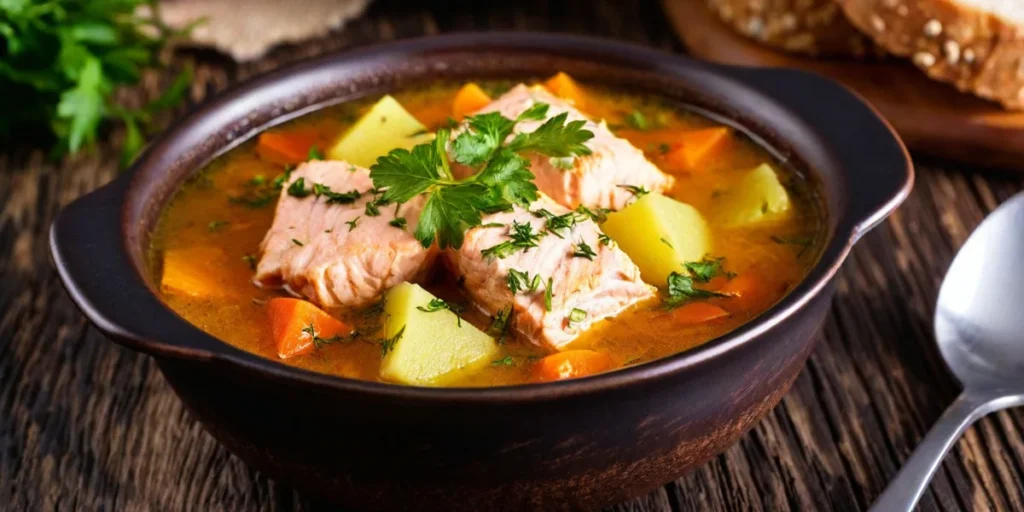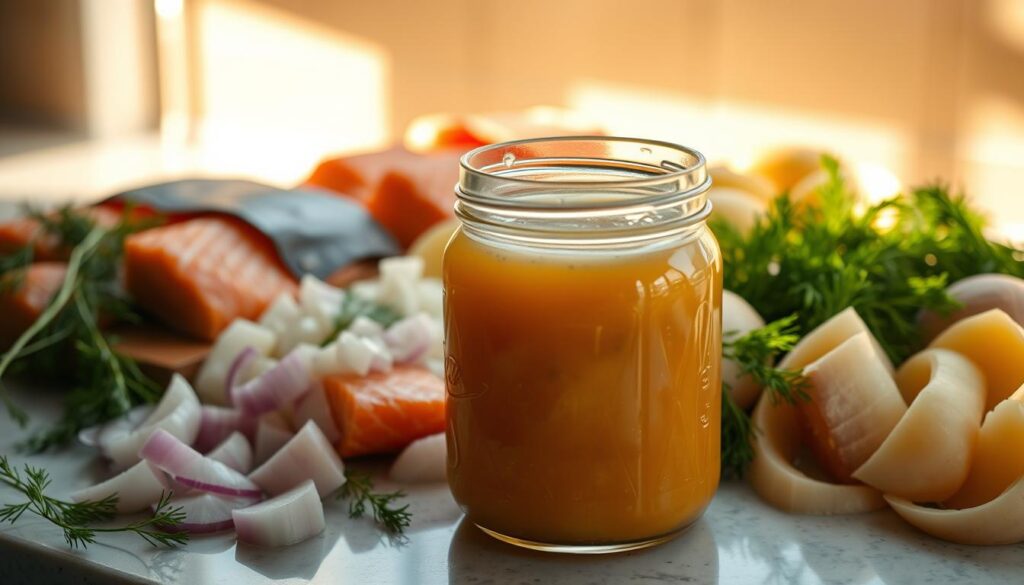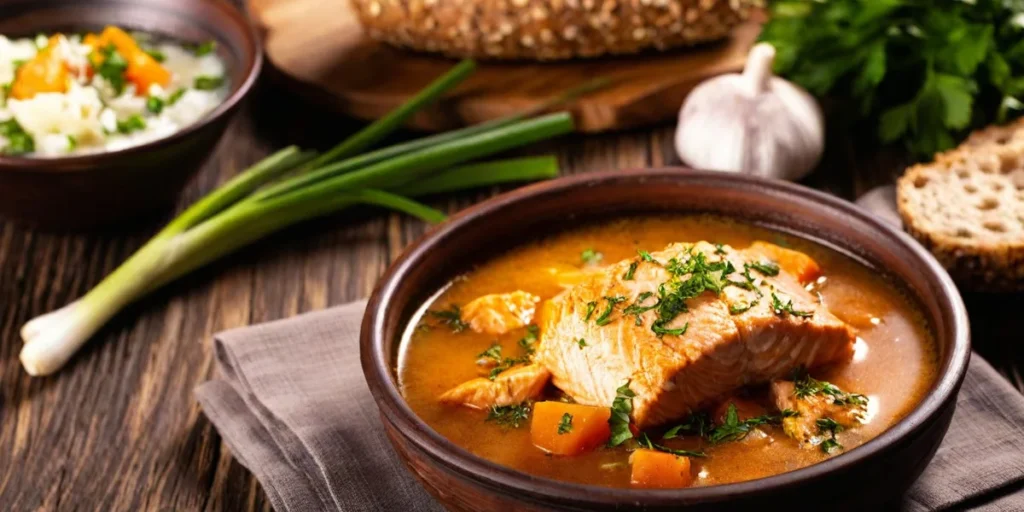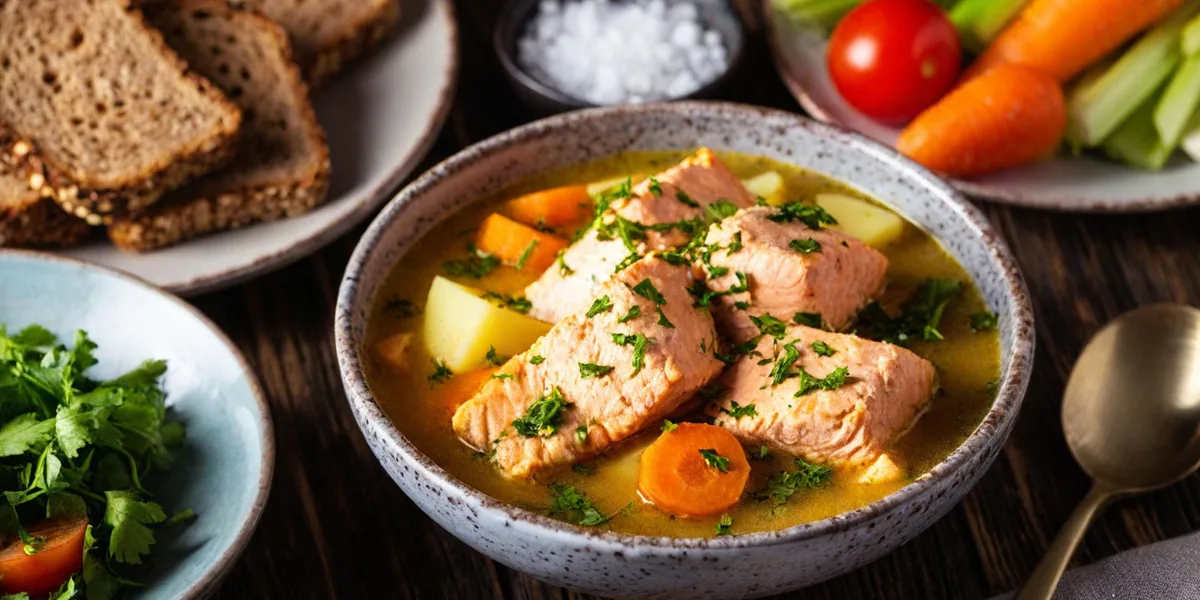Healthy Choice: Salmon Stew Recipe for Dinner
When the weather gets cooler, a warm bowl of homemade goodness is just what you need. Imagine a hearty, flavorful dish that’s both nourishing and easy to make. Our salmon stew recipe is a deliciously comforting meal for any day.
Follow a simple stew recipe to make this comforting meal. It combines the richness of salmon with a mix of vegetables and herbs. Just follow the steps in this article, and you’ll have a warm, satisfying meal ready in no time.
What Makes Salmon Stew a Comforting Dish?
Salmon stew is a top pick for comfort food. It’s rich in flavor and packed with nutrients. Enjoy it on a cold night or when you need a hearty meal.
Nutritional Benefits of Salmon
Salmon is full of protein and healthy fats, like omega-3 fatty acids. These are good for your heart and can lower inflammation. Salmon also offers:
- High-quality protein for muscle repair and growth
- Omega-3 fatty acids for heart health and brain function
- Vitamins and minerals like vitamin D and selenium

The Role of Vegetables in Stews
Vegetables add fiber, vitamins, and minerals to the stew. They also enhance its taste and texture. Common veggies in salmon stews are:
- Carrots for sweetness and crunch
- Potatoes for heartiness and thickness
- Leafy greens like spinach for added nutrition
Mixing salmon with various veggies makes a salmon soup recipe both comforting and healthy. This makes salmon fish soup a perfect choice for a nutritious meal.
Essential Ingredients for Your Salmon Stew
To make a delicious salmon stew, you need the right ingredients. The quality and freshness of these ingredients greatly affect the taste and health benefits of your stew.
Choosing the Right Salmon
Choosing the right salmon is key for a salmon stew recipe. Go for fresh, sustainable salmon fillets for the best taste. If you’re on a budget, canned salmon is a good choice. It’s full of nutrients and can taste great.
Fresh vs. Canned Salmon
Fresh salmon gives a richer texture and flavor, perfect for a salmon chowder recipe. Canned salmon, on the other hand, is easy to use and lasts longer. It’s great when fresh salmon is hard to find or if you’re short on time.
Vegetables and Herbs You Can Use
Adding various vegetables and herbs can make your stew even better. Try using diced onions, grated carrots, celery stalks, and minced garlic cloves. Herbs like thyme, parsley, and dill can also add a lot of flavor to your salmon stew.
For a basic recipe, start with 1 lb salmon fillet, cut into 1-inch cubes, 1 onion finely diced, 1 small carrot grated, 1 celery stalk diced, and 3 garlic cloves minced. You can adjust these amounts based on your taste and how many people you’re serving.

Step-by-Step Preparation Guide
Making a hearty salmon stew is a few steps away. First, prepare your ingredients well. Then, use cooking techniques to bring out the best flavors and textures.
Preparing the Ingredients
Start by getting all the ingredients you need for your salmon stew. You’ll need salmon fillets, vegetables like carrots, potatoes, and onions, and herbs like thyme and parsley. Freshness is key, so pick the best ingredients you can find.
- Cut the vegetables into bite-sized pieces to ensure they cook evenly.
- Season the salmon fillets with salt and pepper to enhance their natural flavor.
- Prepare the aromatics by chopping onions, garlic, and any other herbs you’re using.
Cooking Techniques for Perfect Stew
To cook the stew, sauté the vegetables in olive oil and butter until they’re tender. Next, add minced garlic and tomato paste, cooking for another minute to release their flavors. Pour in fish or chicken broth, and bring the mixture to a simmer.
- Sauté the vegetables in olive oil and butter until they’re tender.
- Add garlic and tomato paste, cooking for another minute.
- Pour in the broth and simmer the stew until the flavors meld together.
- Add the salmon fillets and cook until they’re just done.

By following these steps, you’ll make a delicious salmon stew. It’s nourishing and flavorful. Remember, the key to a great stew is in the preparation and cooking technique. So, take your time and enjoy the process.
To make your salmon stew even more delicious, consider the tips in the next sections. They cover flavor enhancements and cooking methods. With these guidelines, you’ll be well on your way to making a salmon stew that’s sure to please.
Flavor Enhancements for Your Stew
Adding a little creativity with spices and herbs can turn your salmon stew into a masterpiece. To make your stew taste better, try different spices and seasonings.
Spices and Seasonings to Consider
There are countless spices and seasonings to choose from. Chili flakes can give your salmon stew recipe a spicy boost. Here are some other ideas:
- Paprika for a smoky taste
- Dill for a fresh, herbal flavor
- Garlic powder for a savory aroma
- Onion powder to deepen the flavor
Adding Acidity with Lemon or Vinegar
A squeeze of lemon or a splash of vinegar can balance your stew’s flavors. Acidity cuts through the richness of the salmon and other ingredients. You can use:
- Freshly squeezed lemon juice
- White wine vinegar
- Apple cider vinegar for a fruity twist
| Acidity Level | Flavor Profile |
|---|---|
| Low | Rich, heavy flavor |
| Medium | Balanced, harmonious flavor |
| High | Sharp, tangy flavor |
With these flavor enhancements, you can make a salmon stew recipe that’s both tasty and unforgettable, like a salmon chowder recipe.
Choosing the Right Cooking Method
There are many ways to cook salmon stew, each with its own benefits. Pick the method that fits your schedule and taste.
Stovetop vs. Slow Cooker
Cooking on the stovetop lets you adjust flavors and textures easily. It gives you full control over your dish. On the other hand, a slow cooker is perfect for busy days. It cooks the stew slowly, making it rich and flavorful.
Stovetop cooking is quicker, taking about 20-30 minutes. A slow cooker, though, can take 4 to 8 hours on low heat. Your choice depends on how much time you have and what you prefer.
Instant Pot Method for Quick Meal
If you’re in a rush, the Instant Pot is a great choice. It cooks salmon stew fast, under 30 minutes. This makes it perfect for a quick weeknight dinner.
The Instant Pot method keeps the flavors and nutrients of the ingredients. It’s similar to slow cooking but much quicker. It’s ideal for how to make salmon stew when you’re short on time.
No matter the method, the secret to a tasty salmon stew is to cook the salmon just right. Also, make sure the flavors are balanced. Try different cooking methods to find your favorite salmon soup recipe.
Common Mistakes to Avoid
To make your salmon stew perfect, avoid a few common errors. A great salmon fish soup or salmon stew recipe needs detail and know-how.
Here are some key mistakes to watch out for:
- Overcooking the salmon, which can make it dry and tough
- Not balancing the flavors, resulting in a stew that’s either too bland or too overpowering
Overcooking the Salmon
One big mistake in making a salmon stew recipe is overcooking the salmon. This makes the fish dry and tough. To fix this, cook the salmon until it’s just opaque and flakes easily.
Not Balancing Flavors
Another big mistake is not balancing the flavors in your salmon fish soup. A great stew has salty, sweet, sour, and umami flavors. To get this right, taste and adjust the seasoning as you go.
Some tips for balancing flavors include:
- Using a variety of ingredients to create depth and complexity
- Avoiding over-salting or over-acidifying the stew
- Tasting and adjusting the seasoning regularly
By avoiding these mistakes, you can make a delicious salmon stew recipe that everyone will love.
Serving Suggestions and Ideas
Think about what to serve with your salmon stew. A good stew needs sides that boost its taste and feel.
Complementary Side Dishes
Side dishes can make your meal more interesting. For a salmon chowder recipe or stew, try a side salad, roasted veggies, or garlic bread. These pair well with the stew’s rich flavors.
Other great options are steamed asparagus, sautéed spinach, or a light green salad. They offer a cool contrast to the warm stew.
Ideal Pairings with Bread
Bread is a perfect match for stews. For a how to make salmon stew recipe, go for crusty bread. It absorbs the broth well, making each bite more enjoyable.
Consider focaccia, ciabatta, or rustic sourdough too. Each bread brings its own taste and texture to your meal.
Storing and Reheating Leftovers
Leftover salmon stew can be just as tasty as when it’s first made. Just make sure you store and reheat it right. Keeping the dish fresh and safe is key.
Best Practices for Storage
For a fresh taste, store your stew in an airtight container in the fridge. This stops bacteria and keeps the flavors strong. You can keep it for up to 2 days.
Let the stew cool down to room temperature before storing. This stops moisture from making it soggy.
How to Reheat Without Losing Flavor
Reheating your stew right is important to keep its taste and texture. Heat it gently on the stovetop over low heat, stirring now and then. This saves the salmon’s delicate flavor.
Don’t heat it too high, as it can make the salmon tough and mess with the flavors. For small amounts, the microwave is okay, but watch it doesn’t get too hot.
To boost the taste, add some fresh lemon juice or herbs like parsley or dill. This refreshes the flavors and makes it taste like new.
By following these tips, you can enjoy your salmon stew recipe or salmon soup recipe for longer. And it will stay delicious.
Variations of Salmon Stew
You can make a unique salmon stew by trying out different ingredients and cooking ways. This makes salmon stew very appealing.
Creamy vs. Brothy Stews
When making salmon stew, you have to decide if you want it creamy or brothy. A creamy stew gets its richness from heavy cream or coconut cream added late in cooking. A brothy stew, on the other hand, uses more fish or chicken broth, making it lighter.
Creamy Stew: For a creamy version, add heavy cream or coconut cream. This boosts the flavor and makes the stew smooth.
Brothy Stew: For a lighter stew, use lots of fish or chicken broth. Adding veggies like carrots and potatoes helps without making it too thick.
| Characteristics | Creamy Stew | Brothy Stew |
|---|---|---|
| Main Ingredient | Heavy Cream/Coconut Cream | Fish/Chicken Broth |
| Texture | Rich, Velvety | Light, Brothy |
| Flavor Profile | Rich, Creamy | Clear, Brothy |
Incorporating Different Seafood
Adding different seafood can make your salmon stew more interesting. Try adding shrimp, mussels, or clams for a seafood mix.
Shrimp: It brings a sweet taste and firm texture.
Mixing various seafood creates a stew that’s both complex and satisfying. It suits many tastes.
Frequently Asked Questions About Salmon Stew
Exploring salmon stew can raise some questions. We’re here to answer them, so you can cook with confidence.
Using Frozen Salmon
Frozen salmon works great for stew. Just thaw it fully and pat it dry before adding it. This keeps the salmon’s texture and flavor.
Adjusting the Spiciness Level
One of the best things about salmon stew is you can make it your own. You can change the heat by adding more or less chili flakes. This lets you adjust the flavor to your liking or for different tastes when serving others.
Knowing these tips helps you make a tasty and satisfying salmon stew. It’s a great recipe for any skill level, providing a nutritious meal that’s sure to please.

